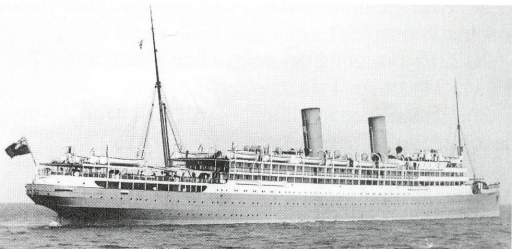David Crampin has shared with Centenary News a piece about the troopship Royal Edward which was torpedoed by a German U-Boat on its way to the battlefields of Gallipoli and his campaign to ensure the men who gave their lives receive equal and just recognition.
David Crampin and his American friend Jack Carlson from Ohio have spent years researching the story after finding inconsistencies when looking into the records of Sam Martin, one of the men who perished on the troopship. Private Samuel Martin was the grandfather of Carlson’s late wife Marjorie, and the great-uncle of Crampin’s wife Beryl in Watford. David tells the story of inconsistency, confusion and injustice.
JUSTICE DENIED FOR GALLIPOLI REINFORCEMENTS
His Majesty’s Troopship ROYAL EDWARD sailed from Avonmouth on the 28th July 1915 and from Devonport on the 30th July, with some 32 officers and 1,350 troops, reinforcements for Gallipoli. The ship arrived in Alexandria on 11th August and, after a one-night stay, passage continued to Gallipoli. Then, at about 09:30 on the 13th August 1915, the ship was sunk by a torpedo from a German U-boat, six nautical miles off Kandelousa. Survivors said the ship sank within six minutes. Over 860 of the military on board died with three quarters of them from the Hampshire and Essex Regiments, the Army Service Corps (ASC) and the Royal Army Medical Corps (RAMC).
The men had come from a variety of backgrounds and a variety of training. The RAMC units had been trained for up to six months prior to their postings to Gallipoli. Most of the Essex men were from the Norfolk Regiment who had volunteered for service in an operational unit. The ASC had recruited men of all ages from all walks of life; men such as Samuel Martin, a stone mason from Cornwall. At 57 years old, Sam would have been one of the oldest. He, with five others, enlisted on the 7th July into the 18th Labour Company, in London. The others included a former policeman, a clay labourer and a cowman. Their army service had lasted just 38 days. The cowman survived but 5 Cornish wives became widows and 16 Cornish children lost their father.
Injustice in recognition
In a genealogy search of his military service, Sam Martin’s records revealed that he had been awarded the British War Medal (BWM) but not the 1914-15 Star, nor the Victory Medal, both of which required operational service in a theatre of war. Egypt was a theatre of war and so was Gallipoli, but the sea between them was not. The ensuing research has uncovered what appeared to be an example of injustice that has troubled relatives of the victims for almost 100 years.
Of the 866 men who died, fewer than 60 had already qualified for the Star, BWM and Victory Medals by virtue of theatre of war service in France or Flanders before the ship sailed from the UK. Without any previous theatre of war service, the remaining 800 were entitled to only the BWM. It was with some surprise, therefore, that our research showed that almost every one of the 200-odd men without previous theatre of war service, in two of the regiments, were each awarded the Star, BWM and Victory Medals while nearly all of the remaining 600 received the BWM only.
The men from the RAMC were said to have qualified by service in Egypt on the 11th August 1915. Like all the other reinforcements on board, they had spent the night in Alexandria. None of them had served in an operational unit but the medics were awarded the 3 medals and the rest just one. The 56 men in the Kings Own Scottish Borderers were awarded the 3 medals because it was said they had served in Gallipoli on 31 July 1915 when, in fact, the ship was just leaving Devonport. Why should they have been favoured? Even the Cornish cowman received all 3 medals having said to have entered Gallipoli on the 12th August 1915, the day before the ship was sunk – when his 5 Cornish compatriots were alive. Why were they, and all the other reinforcements on board the ROYAL EDWARD, denied the same recognition?
Seeking Justice
A major review of Military Medals in 2012 has given us the opportunity to make a case for the Honours and Decorations Committee to reconsider the earlier decision in the light of the inconsistent and unjust way in which the entitlement rules were interpreted. In this 100th year of the ROYAL EDWARD sinking, we believe the sacrifice of all the victims of the troopship should be recognised and, for those who were previously judged to be ineligible for the award of the 1914-15 Star and Victory Medals to have their eligibility endorsed and approved.
We will need public backing for what we are doing and we urge readers to register their support for our campaign with their Member of Parliament or Regimental Association and by emailing royaledwardmedals@btinternet.com.
Image courtesy of Wikimedia Commons
